 Scotland’s top judge Lord Hamilton finally gives in on McKenzie Friends. A SIGNIFICANT VICTORY in the campaign and Holyrood petition to bring MCKENZIE FRIENDS to Scotland’s courts has been won this evening, with the publication of a letter from Scotland’s top judge the Lord President, Lord Hamilton, informing the Scottish Parliament that subject to the Court of Session’s Rules Council’s views, he intends that the Court will enact the relevant Act of Sederunt in May and that McKenzie Friends will be finally brought into force in Scotland in June 2010.
Scotland’s top judge Lord Hamilton finally gives in on McKenzie Friends. A SIGNIFICANT VICTORY in the campaign and Holyrood petition to bring MCKENZIE FRIENDS to Scotland’s courts has been won this evening, with the publication of a letter from Scotland’s top judge the Lord President, Lord Hamilton, informing the Scottish Parliament that subject to the Court of Session’s Rules Council’s views, he intends that the Court will enact the relevant Act of Sederunt in May and that McKenzie Friends will be finally brought into force in Scotland in June 2010.
 Lord Hamilton tells Holyrood : McKenzie Friends in Scotland by June. Lord Hamilton was visibly cautious against using the term “McKenzie Friend” in his letter to the Scottish Parliament, preferring instead to refer to the role of a McKenzie Friend as that of “lay assistance”. Lord Hamilton said : “Following my letter to you of 2 November, I asked two of my colleagues (being the judges responsible for administrative management in the Court of Session) to consider the matter of McKenzie Friends and to report back to me.In view of their report, I intend to bring forward for consideration at the next meeting of the Court of Session Rules Council (on 10 May) a draft of an Act of Sederunt amending the Rules of Court to give effect to the following policy:”
Lord Hamilton tells Holyrood : McKenzie Friends in Scotland by June. Lord Hamilton was visibly cautious against using the term “McKenzie Friend” in his letter to the Scottish Parliament, preferring instead to refer to the role of a McKenzie Friend as that of “lay assistance”. Lord Hamilton said : “Following my letter to you of 2 November, I asked two of my colleagues (being the judges responsible for administrative management in the Court of Session) to consider the matter of McKenzie Friends and to report back to me.In view of their report, I intend to bring forward for consideration at the next meeting of the Court of Session Rules Council (on 10 May) a draft of an Act of Sederunt amending the Rules of Court to give effect to the following policy:”
1. To acknowledge the possibility of lay assistance to the extent of (a) providing moral support; (b) helping to manage court documents and other papers; (c) taking notes of proceedings; and (d) quietly advising the party litigant on (i) points of law and procedure; (ii) issues which the party litigant might wish to raise with the court; (iii) questions which the party litigant might wish to ask witnesses. The lay assistant would be able to sit beside or behind the party litigant in court, as he or she wished, and accompany the party litigant at a hearing in chambers. The party litigant would be responsible for any expenses incurred by the lay assistant.”
 Lord President to enact McKenzie Friends Page 2. 2. The lay assistant would not be able to act as the party litigant’s agent. He or she would have no authority to sign court documents. The lay assistant would have no right to address the court or examine witnesses.
Lord President to enact McKenzie Friends Page 2. 2. The lay assistant would not be able to act as the party litigant’s agent. He or she would have no authority to sign court documents. The lay assistant would have no right to address the court or examine witnesses.
3. There is a procedure whereby the party litigant informs the court of the intention that there should be such assistance and obtains the approval of the court of the person in question taking on the role. This is done by motion in the process which is intimated to the other party and which would normally be granted without a hearing if unopposed.
4. The party litigant would be entitled to communicate to the lay assistant information, including the court papers lodged in process, which otherwise he or she would not be entitled to see. Such papers may well be of a private and sensitive nature. There would therefore be a mechanism by which the lay assistant would acknowledge a duty of confidentiality and give an undertaking to use the information obtained from other persons in the process (whether parties or third party havers) solely for the purpose of the litigation. To enable the court to police the behaviour of a lay assistant and, in an extreme case, to exercise a sanction against him or her, the party litigant and the intended lay assistant should complete and sign a certificate to be lodged in process with the motion.
5. The certificate should (i) state the name and address of the intended lay assistant; (ii) give a brief summary of the lay assistant’s relevant experience and state whether he or she is related to the party litigant; (iii) confirm that the lay assistant has no interest in the case and is to receive no remuneration for his or her services in any form; and (iv) state the lay assistant’s understanding of the duty of confidentiality and his or her undertaking not to use any documents recovered in the process for any purpose other than the litigation. There would be an appropriate form containing the undertaking with boxes to be completed.
6. There would be a “presumption” in favour of allowing a party litigant to have a lay assistant. This would be achieved by providing that the court should grant the motion unless it is satisfied that it would be contrary to the efficient administration of justice to do so. The court would have the power to revoke the permission if the lay assistant were to behave irresponsibly or were otherwise to impede the efficient administration of justice.
 Lord President to enact McKenzie Friends Page 3. That should assist to clarify the position in the Court of Session. Subject to the Council’s views, I would intend that the Court makes the Act of Sederunt in May and that it is brought into force in June.
Lord President to enact McKenzie Friends Page 3. That should assist to clarify the position in the Court of Session. Subject to the Council’s views, I would intend that the Court makes the Act of Sederunt in May and that it is brought into force in June.
It remains my view that going any further and allowing a lay representative rights of audience in the Court of Session is a matter for primary legislation. I do not therefore propose to take any further action in relation to this, save to say that this is of course a matter about which the Civil Courts Review has made a recommendation and that the Scottish Government will no doubt adopt a position on that recommendation in due course.
The burden of the matter in relation to the Sheriff Court lies with the Sheriff Court Rules Council. Different considerations may apply there, given that in certain circumstances it is already possible (by virtue of legislative intervention) for lay representatives to address the court. Nevertheless, I have made the Sheriff Court Rules Council aware of the action I am taking in relation to the Court of Session and I understand that the matter has been referred to one of their working groups for consideration in early course.”
 Margo MacDonald MSP, ‘gem’ of the Scottish Parliament – It should be a right to have a McKenzie Friend. Crucially Lord Hamilton has now also conceded there should be a presumption in favour of allowing a party litigant to have a McKenzie Friend accompany them in court. This ‘right’ has existed in courts in England & Wales for a number of years and is included in the guidance on the use of McKenzie Friends in England & Wales. Prior to the Lord President’s letter to Parliament today, there had been considerable resistance by the Scottish Government and judiciary to bring the ‘presumption in favour of having a McKenzie Friend’ to Scotland’s courts, a right which has been considerably referred to by independent MSP Margo MacDonald, during hearings at the Scottish Parliament on the McKenzie Friends Petition 1247.
Margo MacDonald MSP, ‘gem’ of the Scottish Parliament – It should be a right to have a McKenzie Friend. Crucially Lord Hamilton has now also conceded there should be a presumption in favour of allowing a party litigant to have a McKenzie Friend accompany them in court. This ‘right’ has existed in courts in England & Wales for a number of years and is included in the guidance on the use of McKenzie Friends in England & Wales. Prior to the Lord President’s letter to Parliament today, there had been considerable resistance by the Scottish Government and judiciary to bring the ‘presumption in favour of having a McKenzie Friend’ to Scotland’s courts, a right which has been considerably referred to by independent MSP Margo MacDonald, during hearings at the Scottish Parliament on the McKenzie Friends Petition 1247.
 Lord Gill’s Civil Courts Review recommended McKenzie Friends should have a right to address the court. However, Lord Hamilton confirmed that for now, McKenzie Friends, or ‘lay assistants’, will have no right of audience, and will therefore not be able to address the court, examine witnesses or sign court documents, although recent recommendations by Scotland’s Lord Justice Clerk, Lord Gill in the Civil Courts Review, did actually recommend McKenzie Friends should (when introduced to Scottish Courts) be given the right to address the court in certain circumstances.
Lord Gill’s Civil Courts Review recommended McKenzie Friends should have a right to address the court. However, Lord Hamilton confirmed that for now, McKenzie Friends, or ‘lay assistants’, will have no right of audience, and will therefore not be able to address the court, examine witnesses or sign court documents, although recent recommendations by Scotland’s Lord Justice Clerk, Lord Gill in the Civil Courts Review, did actually recommend McKenzie Friends should (when introduced to Scottish Courts) be given the right to address the court in certain circumstances.
Lord Hamilton went on in his letter to the Parliament, appearing to suggest in his letter to the Parliament that ‘relevant experience’ may play a part in deciding whether someone can or cannot be a McKenzie Friend, although some tonight queried that suggestion, as often the term “lay” refers to someone outside the legal profession and unconnected with it, whereas figures from the judiciary would like to see only legally qualified individuals as McKenzie Friends.
A senior solicitor said this evening : “I would be cautious about the qualifications the Lord President is apparently intending to impose on would-be McKenzie Friends, prior to the courts acceptance of their role. This does not, to my knowledge, occur in England & Wales.”
He continued : “I do feel that, while obviously someone intending to fulfil the role as a McKenzie Friend in a Scottish court should have to show they are at least capable of that role, I feel this “relevant experience” issue may prove an unnecessary barrier, and may even be used to bar people from the role of a McKenzie Friend who otherwise may perform very well.”
A senior official from one of Scotland’s consumer organisations welcomed tonight’s developments, saying : “We welcome the Lord President’s moves to ensure that consumers of legal services in Scotland will be able to avail themselves of the well proven and invaluable facility of having a McKenzie Friend by their side in a Scottish court.”
She went on : “However there are some potential stumbling blocks in the Lord President’s plans, which we feel are unnecessary and are very far from how McKenzie Friends operate in other jurisdictions. Nevertheless this is a first step and we look forward to see further developments and an implementation of Lord Gill’s Civil Courts Review recommendations as soon as practicably possible.”
A legal insider studying the Lord President’s latest intentions on McKenzie Friends said tonight : “Apart from the fact that the Lord President has had to perform an abrupt about turn on his previously stated position I think it is a storm in a teacup. Worse, he adds certain additional provisos which only serve to muddy the water and all that is being offered is that already established by precedent. Nor does he offer any credible or detailed explanation of ignoring why Lord Gill’s recommendation that McKenzie Friends should be allowed to address the Court. The Lord President’s credibility rating was already zero, this does nothing to alter my opinion.”
![]() Justice Secretary MacAskill & Lord Hamilton wrongly claimed McKenzie Friends had always existed. Clearly there are some problems still to overcome and many questions yet to be answered – not least the fact that on several occasions, both the Lord President and Justice Secretary Kenny MacAskill have claimed Scotland always had ‘supportive friends’ in courts, when in fact, no such ‘supportive friend’ ever existed. Enquiries to the Scottish Courts Service direct confirmed no such role, also confirming that McKenzie Friends had not existed in Scotland’s civil courts, despite further protestations from the Scottish Government to the contrary.
Justice Secretary MacAskill & Lord Hamilton wrongly claimed McKenzie Friends had always existed. Clearly there are some problems still to overcome and many questions yet to be answered – not least the fact that on several occasions, both the Lord President and Justice Secretary Kenny MacAskill have claimed Scotland always had ‘supportive friends’ in courts, when in fact, no such ‘supportive friend’ ever existed. Enquiries to the Scottish Courts Service direct confirmed no such role, also confirming that McKenzie Friends had not existed in Scotland’s civil courts, despite further protestations from the Scottish Government to the contrary.
Also the quite considerable question of exactly why McKenzie Friends have been excluded from Scotland’s courts for some forty years, while many other international jurisdictions took on the McKenzie Friend facility after it first came into existence upon the result of McKenzie v McKenzie, 1971, remains to be answered, not least because the four decades long exclusion has led to a significant prejudice against Scots access to justice being regularly denied, particularly when law firms & solicitors refused, or were instructed by their governing body to refuse to represent individual litigants or groups in litigation which the legal profession itself did not wish to pursue for policy, political, or other reasons.
 Court of Session judge Lord Woolman granted Scots their first use of a McKenzie Friend, while Parliament discussed petition. As we all know now, Scotland’s first Civil Court use of a McKenzie Friend, occurred during November 2009 in the long running damages action of party litigant Martin Wilson v North Lanarkshire Council & others. I reported on that first use of a McKenzie Friend, here : First use of McKenzie Friend in Scotland as Court of Session sweeps aside 40 years of lawyers monopoly over public access to justice
Court of Session judge Lord Woolman granted Scots their first use of a McKenzie Friend, while Parliament discussed petition. As we all know now, Scotland’s first Civil Court use of a McKenzie Friend, occurred during November 2009 in the long running damages action of party litigant Martin Wilson v North Lanarkshire Council & others. I reported on that first use of a McKenzie Friend, here : First use of McKenzie Friend in Scotland as Court of Session sweeps aside 40 years of lawyers monopoly over public access to justice
Well, at least McKenzie Friends are on the way for Scotland, officially .. and with some guidance, a presumption of a right, but of course, work still to be done by the looks of it. You can read my earlier coverage of the campaign to bring McKenzie Friends to Scotland, here : McKenzie Friends for Scotland : The story so far
All written submissions for the McKenzie Friend petition at the Scottish Parliament can be read here : Written submissions for Petition 1247, McKenzie Friends for Scotland
This has been a long campaign, thorny at times, and obviously there is still a long way to go to ensure Scots have the same rights & entitlements of access to justice as everyone else in the UK. Keep supporting McKenzie Friends for Scotland !
Finally, you may ask, what does it all mean to the layman ? Well, now, you don’t need a lawyer to get into court .. just find a McKenzie Friend, if you cant obtain the rather expensive, and many times, fairly poor services of a solicitor who many not be acting in your best interests anyway …




 Scottish Parliament will hear proposals to introduce ‘talking’ McKenzie Friend to Scotland. MCKENZIE FRIENDS FOR SCOTLAND will soon ‘move from silent pictures to the talkies’, and have legislative backing for their use in Scots Law, according to sources today at the Scottish Government’s Justice Department, after Communities Safety Minister Fergus Ewing gave testimony to Holyrood’s Justice Committee last Tuesday informing MSPs the issue of McKenzie Friends will be introduced to the Legal Services Bill during ‘Stage Two’ of its passage through the Scottish Parliament.
Scottish Parliament will hear proposals to introduce ‘talking’ McKenzie Friend to Scotland. MCKENZIE FRIENDS FOR SCOTLAND will soon ‘move from silent pictures to the talkies’, and have legislative backing for their use in Scots Law, according to sources today at the Scottish Government’s Justice Department, after Communities Safety Minister Fergus Ewing gave testimony to Holyrood’s Justice Committee last Tuesday informing MSPs the issue of McKenzie Friends will be introduced to the Legal Services Bill during ‘Stage Two’ of its passage through the Scottish Parliament.






















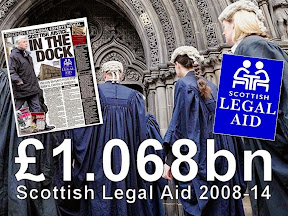















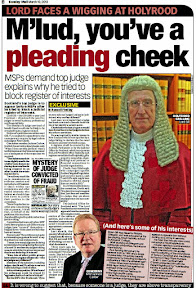

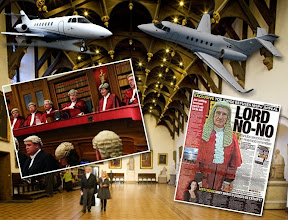


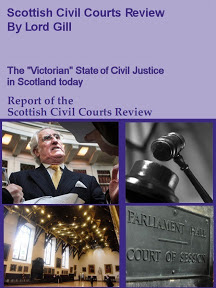





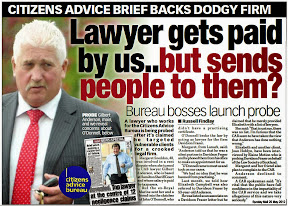



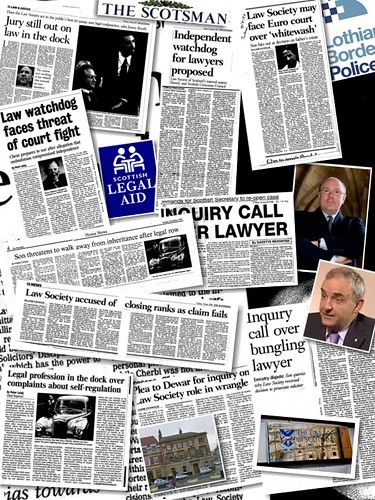




You must be logged in to post a comment.